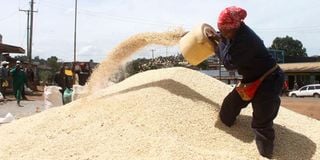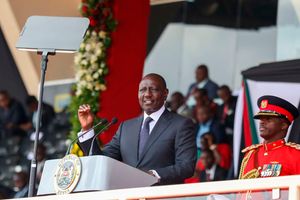Premium
State fails to import maize, dashes hopes of cheaper unga

Farmers dry maize in Elburgon town, Nakuru County, on January 22, 2022. Kenyans’ hopes of buying cheaper maize flour have been dashed.
Kenyans’ hopes of buying cheaper maize flour have been dashed following reports that there is no ship ferrying the commodity from overseas this month as promised by the State.
The government had pledged to import maize to address the shortage and ultimately lower the price of maize flour. However, according to the ship manifest released by the Kenya Ports Authority yesterday, vessels expected to dock at the port of Mombasa show wheat is the only grain import.
The wheat is being shipped in on the Panther Max vessel.
The vessel left Russia on March 2 and has docked in different ports, including Turkey and Egypt, while heading to Kenya. It is expected to arrive on Thursday.
According to KPA, vessels expected at the port of Mombasa within the next 14 days will be shipping fertiliser, cooking oil, and steel coils, among other items. Last week, the government extended the duty-free importation of maize to August.
National Treasury Cabinet Secretary Njuguna Ndung’u said in a gazette notice that the government is expecting 500,000 tonnes of white maize, 500,000 tonnes of rice and 250,000 tonnes of soya beans and 500,000 tonnes of yellow maize.
The State said the yellow maize would be used to make animal feeds. However, the importation of duty-free maize has been delayed because millers had disputed the terms and conditions set by the State, including the price of Sh4,200 per 90kg bag.
“To the best of our knowledge, we have not seen a list of gazetted importers and none of our members has been issued the permit to import. At the moment, the cost of a 90-kilo bag of maize will vary depending on the source, but would be in the range of Sh5,500 to Sh5,600,” said Cereal Millers Association chief executive officer Paloma Fernandez.
Yesterday while receiving food aid from World Food Programme at the Grain Bulk Millers Limited, Deputy President Rigathi Gachagua said the State waived import duty to allow millers to bring in 900,000 metric tonnes of white maize and 600,000 metric tonnes of rice between February and August.
“These stocks will plug in the deficit until the next harvest later this year,” he said.
Mr Gachagua said the aid is a major relief to some 5.4 million Kenyans who are facing starvation, especially children under five years and expectant mothers.
“We have received 25,000 metric tonnes of wheat, a generous contribution from the people of the United Kingdom, Norway, Belgium, Italy, Netherlands, Switzerland, Slovenia and the Czech Republic through our long-standing partner, the World Food Programme,” said the DP.
He lauded Ukraine, describing farmers there as gallant, resilient and industrious people who have withstood the terrors of war to feed the world.
“We thank USAID, which has donated more than US$277 million and another U$60 million in Food to Kenya through the WFP, this has been ongoing for the past year, complementing our efforts of countering famine- a national disaster due to prolonged drought,” he said.
The DP said the food aid will help feed expectant mothers in Turkana, Tana River and other drought-hit counties.
“In a few days, a lactating mother in Marsabit or Mandera will have food for her family and milk for her baby. In a few days, that one child in Samburu or Kitui will sleep with a full stomach. We look forward to more support, even as we receive a shipment of 16,000 metric tons of Sorghum from USAID,” added the DP.
Mr Gachagua said the assistance also comes when the WFP is about to roll out the Lisha Jamii Phase II Programme from April to September 2023.





